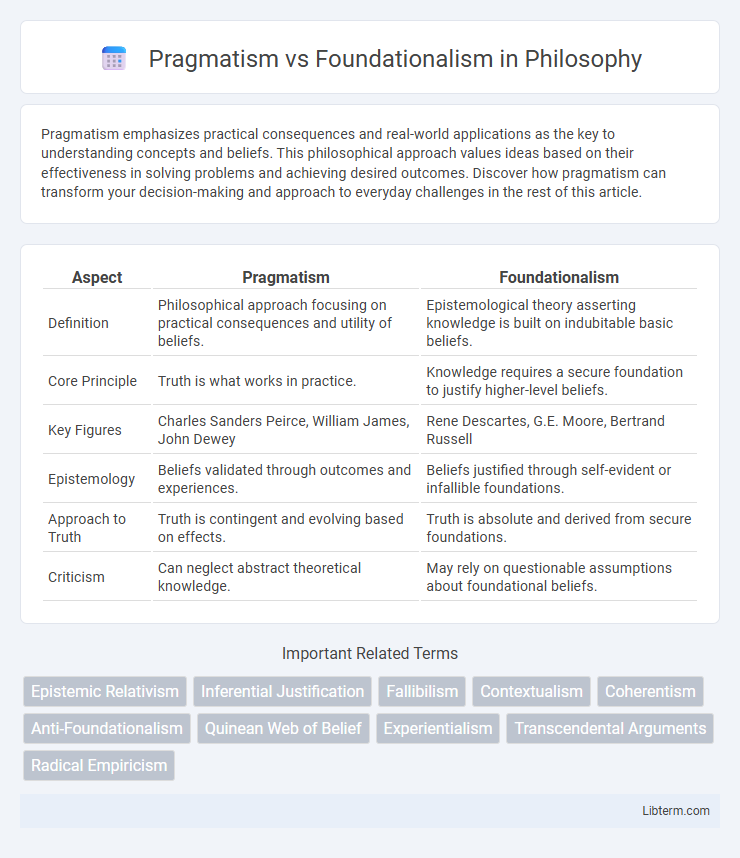Pragmatism emphasizes practical consequences and real-world applications as the key to understanding concepts and beliefs. This philosophical approach values ideas based on their effectiveness in solving problems and achieving desired outcomes. Discover how pragmatism can transform your decision-making and approach to everyday challenges in the rest of this article.
Table of Comparison
| Aspect | Pragmatism | Foundationalism |
|---|---|---|
| Definition | Philosophical approach focusing on practical consequences and utility of beliefs. | Epistemological theory asserting knowledge is built on indubitable basic beliefs. |
| Core Principle | Truth is what works in practice. | Knowledge requires a secure foundation to justify higher-level beliefs. |
| Key Figures | Charles Sanders Peirce, William James, John Dewey | Rene Descartes, G.E. Moore, Bertrand Russell |
| Epistemology | Beliefs validated through outcomes and experiences. | Beliefs justified through self-evident or infallible foundations. |
| Approach to Truth | Truth is contingent and evolving based on effects. | Truth is absolute and derived from secure foundations. |
| Criticism | Can neglect abstract theoretical knowledge. | May rely on questionable assumptions about foundational beliefs. |
Understanding Pragmatism and Foundationalism
Pragmatism emphasizes practical consequences and real-world applications as the basis for truth, prioritizing beliefs that work effectively in experience and problem-solving. Foundationalism asserts that knowledge is structured on basic, self-evident truths or axioms that provide a secure foundation for building further justified beliefs. Understanding pragmatism involves recognizing its fluid, experience-based approach, while foundationalism relies on stable, indubitable premises to support knowledge systems.
Historical Origins and Key Proponents
Pragmatism originated in the late 19th century with key proponents like Charles Sanders Peirce, William James, and John Dewey, emphasizing practical consequences and experiences as the basis for meaning and truth. Foundationalism traces back to early modern philosophy, notably with Rene Descartes, who sought indubitable basic beliefs as the foundation for knowledge. These historical origins highlight pragmatism's focus on utility and evolving understanding, contrasted with foundationalism's search for absolute certainty in epistemic structures.
Core Principles of Pragmatism
Pragmatism emphasizes the practical application of ideas and the belief that truth is determined by the success of their practical consequences, contrasting with Foundationalism's focus on immutable, self-evident truths as the basis of knowledge. Core principles of Pragmatism include the rejection of absolute foundations, the emphasis on experience and experimentation, and the view that concepts and theories are tools for problem-solving rather than mirrors of reality. This approach prioritizes adaptability, continuous inquiry, and the usefulness of beliefs in guiding action over adherence to fixed epistemic grounds.
Main Tenets of Foundationalism
Foundationalism asserts that knowledge is structured like a building, resting on indubitable basic beliefs that provide justification for all other beliefs. These foundational beliefs are self-evident, infallible, or evident to the senses, serving as secure starting points in the epistemic hierarchy. The main tenets emphasize the necessity of these basic beliefs to avoid infinite regress and ensure a stable, objective foundation for knowledge.
Epistemological Differences Explored
Pragmatism emphasizes the practical consequences and utility of beliefs as the basis for truth, rejecting fixed foundational principles and favoring a dynamic, evolving understanding of knowledge. Foundationalism asserts that knowledge rests upon indubitable, self-evident truths or basic beliefs that provide a secure basis for all other knowledge claims. Epistemologically, pragmatism challenges the search for absolute certainty inherent in foundationalism, promoting instead a flexible approach where beliefs are validated through their success in practical application and problem-solving.
Practical Applications in Philosophy
Pragmatism emphasizes practical consequences and real-world applications as the basis for meaning and truth, guiding philosophical inquiry towards actionable outcomes in ethics, education, and law. Foundationalism seeks indubitable first principles to justify knowledge, providing a structured framework crucial for disciplines like logic and epistemology. In practice, pragmatism fosters adaptive problem-solving and innovation, while foundationalism ensures rigorous standards for certainty and coherence in philosophical reasoning.
Strengths and Critiques of Pragmatism
Pragmatism excels in its practical approach to truth, emphasizing outcomes and real-world applications over abstract ideals, which promotes flexibility and adaptability in problem-solving. Critics argue that pragmatism risks relativism by valuing usefulness over absolute truths, potentially undermining objective knowledge and consistency. Its strength lies in dynamic inquiry, yet it faces challenges in establishing firm epistemic foundations compared to foundationalism's search for indubitable beliefs.
Challenges and Defenses of Foundationalism
Foundationalism faces challenges such as the problem of infinite regress and the difficulty in identifying indubitable basic beliefs that serve as a secure foundation for knowledge. Critics argue that foundational beliefs may be influenced by subjective factors, undermining their supposed certainty. Defenders of foundationalism respond by proposing coherentism as a supplement or by emphasizing self-evident, incorrigible, or empirical sensory experiences as robust foundations for knowledge.
Pragmatism vs Foundationalism in Modern Thought
Pragmatism in modern thought challenges Foundationalism by rejecting the search for indubitable, absolute foundations for knowledge, emphasizing instead the practical consequences and utility of beliefs as criteria for truth. Foundationalism maintains a hierarchical structure of knowledge based on self-evident or infallible premises, while Pragmatism argues that beliefs are justified through their coherence within a web of experiences and their success in problem-solving contexts. Contemporary philosophers often align with Pragmatism's flexible, dynamic approach, which better accommodates scientific progress and the evolving nature of human understanding compared to Foundationalism's rigid epistemic framework.
Conclusion: Weighing the Philosophical Impacts
Pragmatism emphasizes practical consequences and adaptive knowledge, contrasting with Foundationalism's search for indubitable certainty through basic beliefs. The philosophical impact reveals Pragmatism's flexibility in addressing real-world problems, while Foundationalism secures logical coherence and epistemic structure. Weighing these approaches highlights the tension between dynamic truth and stable justification in epistemology.
Pragmatism Infographic

 libterm.com
libterm.com